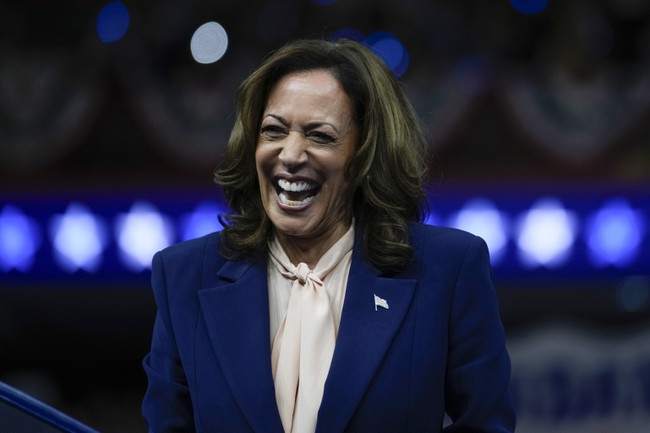
Vice President Kamala Harris recently announced her plan to reduce the impact of inflation by imposing price controls, ostensibly to prevent “price gouging.”
Surprisingly, nobody seems to like the plan – including leftist media outlets, several of whom have published reports criticizing Harris’ plan while they try their darndest to make sure she wins the election in November.
The vice president’s campaign announced on Wednesday that she will enact “the first ever federal ban on price gouging on food and groceries—setting clear rules of the road to make clear that big corporations can’t unfairly exploit consumers to run up excessive corporate profits on food and groceries.”
Harris will propose, what her campaign bills as “the first-ever federal ban on price gouging on food and groceries—setting clear rules of the road to make clear that big corporations can’t unfairly exploit consumers to run up excessive corporate profits on food and groceries.”
— Philip Melanchthon Wegmann (@PhilipWegmann) August 15, 2024
Then in a Friday statement, the Harris/Walz campaign said: “Extreme consolidation in the food industry has led to higher prices that account for a large part of higher grocery bills.” Economists balked at that:
Several economists have taken issue with Harris’ plan.
Some economists, however, rejected the notion of corporate power as an important cause of inflation, saying a limit on price hikes could result in shortages of goods.
Michael Jones, an economics professor at the University of Cincinnati, said a government-imposed ceiling on prices could cause stores to run out of goods in times of scarcity.
“If there’s a restriction on the prices that companies can charge for products, they simply won’t supply them,” Jones told ABC News.
CNN even chimed in, quoting other economists who outlined the problem with such an action on the part of the federal government.
Gavin Roberts studied anti-price gouging laws some states passed during the pandemic. One of the biggest effects he observed, especially at grocery stores, was that these laws motivated people “to go buy goods more than they would if prices had risen.”
When prices are high, in most cases, the best policy action in response is actually taking no action, Roberts, the chair of Weber State University’s economics department, told CNN.
That would cause consumers who are deterred by, say, high prices of beef, to instead purchase another type of meat or protein. That helps keep beef on the grocery store shelves for people who want it enough to pay the higher prices.
And while Harris claims her proposal “will help the food industry become more competitive,” Roberts said it would do just the opposite. “It’s more likely to maintain that status quo,” he said because it would keep new competition from moving in to take advantage of the bigger profit margins — competition that could have helped lower prices in the long run.
Jason Furman, an economist who served in the Obama administration told The New York Times that Harris’ proposal would harm consumers. “This is not sensible policy, and I think the biggest hope is that it ends up being a lot of rhetoric and no reality,” he said. “There’s no upside here, and there is some downside.”
The Washington Post’s editorial board published an op-ed calling the plan a “gimmick.”
Never mind that many stores are currently slashing prices in response to renewed consumer bargain hunting. Ms. Harris says she’ll target companies that make “excessive” profits, whatever that means. (It’s hard to see how groceries, a notoriously low-margin business, would qualify.) Thankfully, this gambit by Ms. Harris has been met with almost instant skepticism, with many critics citing President Richard M. Nixon’s failed price controls from the 1970s. Whether the Harris proposal wins over voters remains to be seen, but if sound economic analysis still matters, it won’t.
In another piece for The Post, columnist Catherine Rampell savaged the price gouging policy, referring to it as “a sweeping set of government-enforced price controls across the industry.”
It’s hard to exaggerate how bad this policy is. It is, in all but name, a sweeping set of government-enforced price controls across every industry, not only food. Supply and demand would no longer determine prices or profit levels. Far-off Washington bureaucrats would. The FTC would be able to tell, say, a Kroger in Ohio the acceptable price it can charge for milk.
At best, this would lead to shortages, black markets and hoarding, among other distortions seen previous times countries tried to limit price growth by fiat. (There’s a reason narrower “price gouging” laws that exist in some U.S. states are rarely invoked.) At worst, it might accidentally raise prices.
That’s because, among other things, the legislation would ban companies from offering lower prices to a big customer such as Costco than to Joe’s Corner Store, which means quantity discounts are in trouble. Worse, it would require public companies to publish detailed internal data about costs, margins, contracts and their future pricing strategies. Posting cost and pricing plans publicly is a fantastic way for companies to collude to keep prices higher — all facilitated by the government.
Harris’ proposal is little more than a way to deflect blame for inflation and other economic woes Americans are facing from the Biden administration and place it on corporations. It is also aimed at giving the government more control over the economy, thereby expanding the scope of its influence and power.
It is also a great way to alienate voters, many of whom know that getting the government more involved in the economy will only make it worse for them. This is why leftist media outlets are taking her to task over the idea – they know it will only help former President Donald Trump during election time.
Perhaps this is why Democrats are recommending that the vice president refrain from discussing policy until after the election. They know what a radical she is, and that this will turn voters off.
